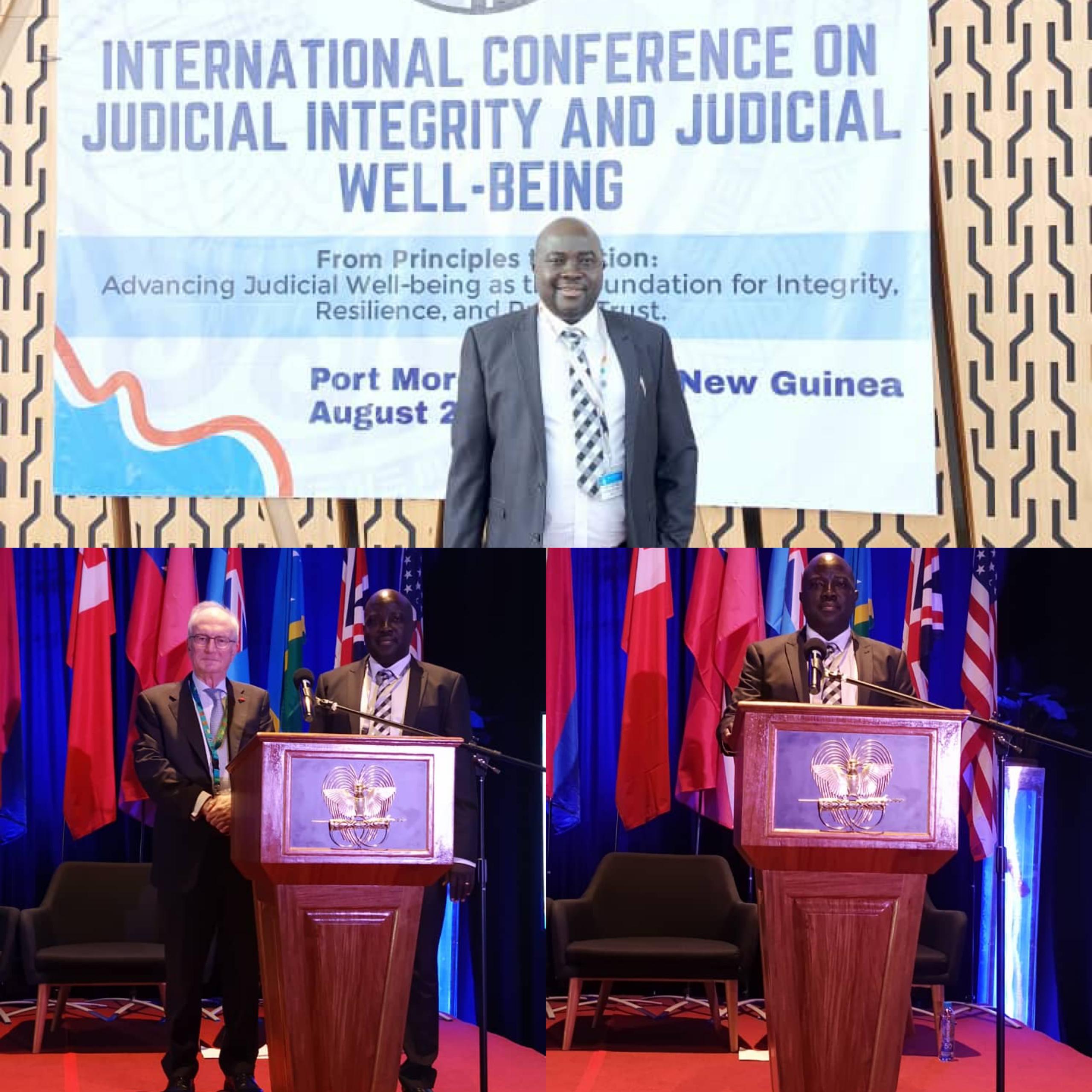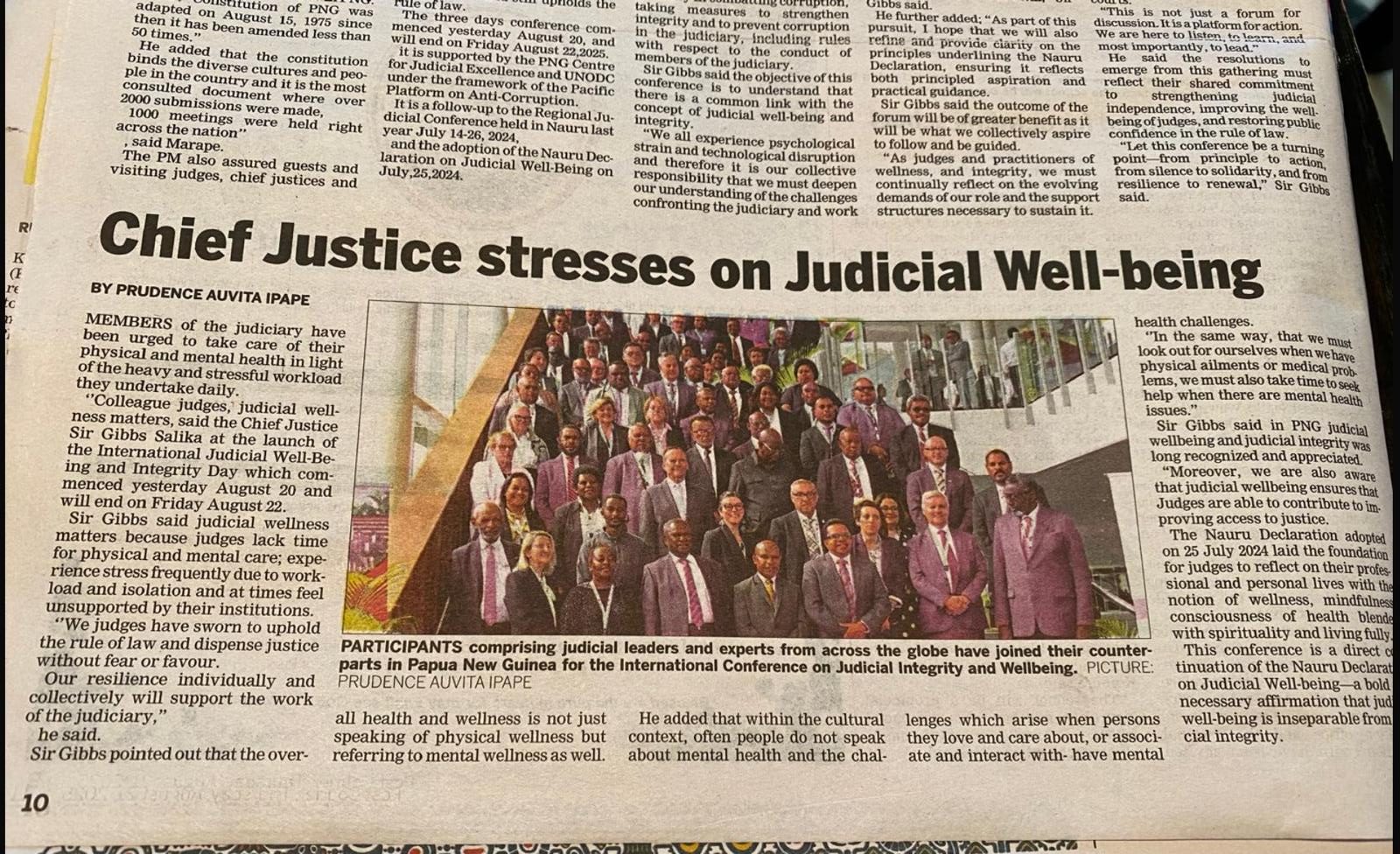THE NAURU DECLARATION ON JUDICIAL WELL BEING

The Nauru Declaration on Judicial Well Being (The Declaration) , adopted on 25 July, 2024, at the Regional Judicial Conference on Integrity and Judicial Wellbeing in Nauru, marks a pivotal moment in recognising and addressing the mental, physical, and emotional health of judicial officers worldwide. The initiative was spearheaded by Justice Rangajeeva Wimalasena, President of the Court of Appeal in Nauru and developed through a collaborative effort involving nearly 20 judicial leaders from diverse regions, including England and Wales, Ukraine, Canada, Portugal, the Caribbean, Jamaica, Singapore, and Nigeria, and supported by the United Nations Office on Drugs and Crime (UNODC) and the Global Judicial Integrity Network (GJIN).
The involvement of CMJA’s President, Hon. Justice Lynne C Leitch and the CMJA Director of Programmes, Judge Shamim Qureshi as well as a number of Chief Justices and judicial officers from Commonwealth jurisdictions in the drafting committee for the Nauru Declaration highlighted CMJA’s commitment to judicial well-being.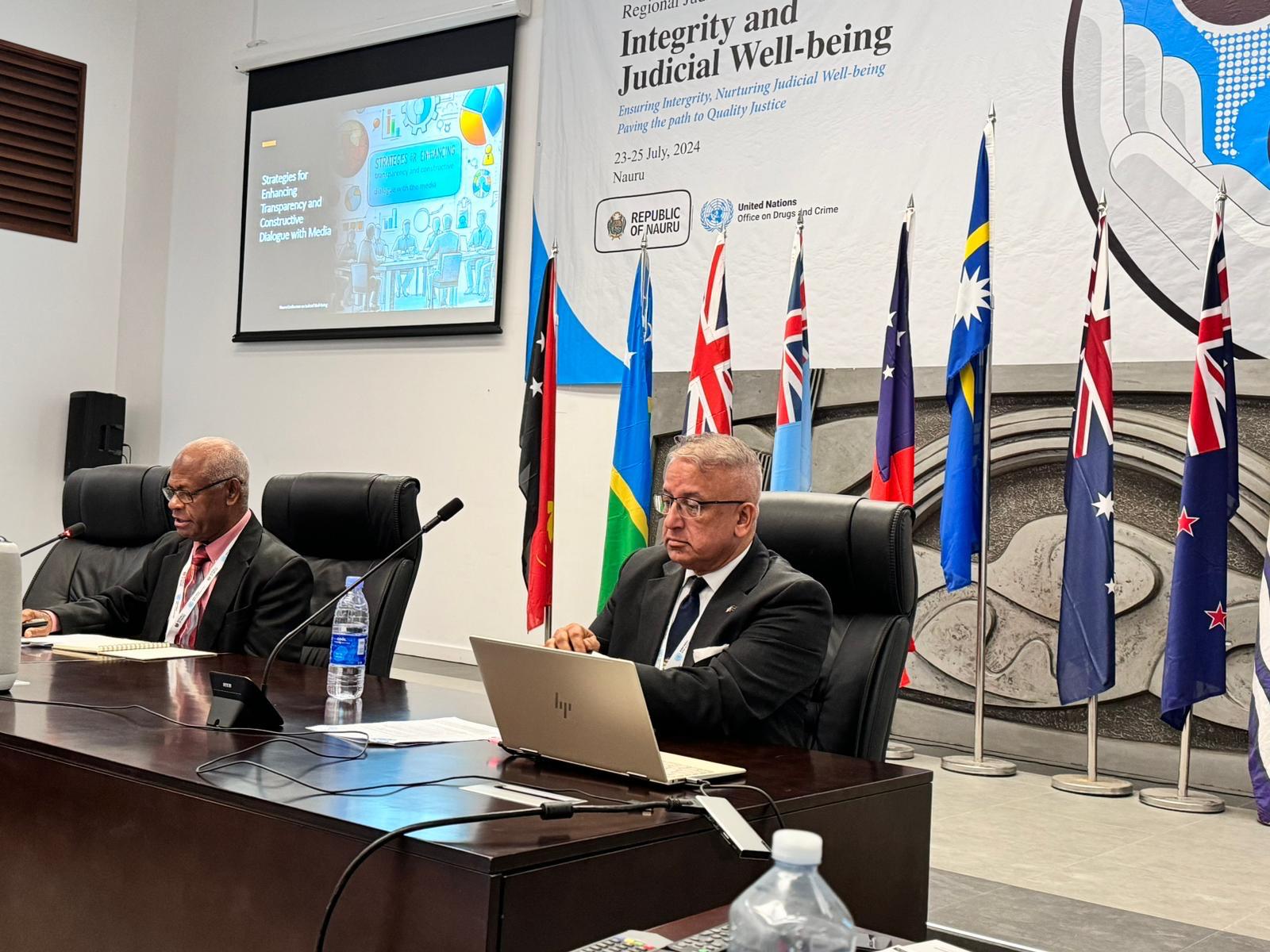
The CMJA has been actively engaged in promoting judicial well-being since 2017. Through CMJA’s yearly educational Conferences and panel discussions, the Association has made significant strides to address judicial stress and well-being and in raising awareness, fostering dialogue, and supporting initiatives
The CMJA has emphasised the importance of an ethical and inclusive judicial culture, as highlighted in the Nauru Declaration.
The CMJA looks forward to encouraging its network of judicial officers across the Commonwealth to share knowledge, resources, and best practices on judicial well-being.
The idea of a Declaration emerged from a growing awareness of the universal issue of judicial stress, highlighted by studies like the UNODC’s global survey, which found 92% of judges experience stress, primarily due to excessive workloads, and 80% believe judiciaries do not adequately address well-being.
The Declaration aims to destigmatise judicial stress, promote an ethical and inclusive judicial culture, and ensure systemic support for judges’ well-being. It aligns with the Bangalore Principles of Judicial Conduct, particularly emphasising that judicial well-being is critical for maintaining independence, impartiality, and integrity. It recognises the judiciary as a “human system,” dependent on the health of individual judges to deliver quality justice.
The Declaration outlines commitments and principles for promoting integrity and wellbeing within the judiciary. It declares that:
- Judicial wellbeing is essential and must be recognised and supported;
- Judicial stress is not a weakness and must not be stigmatised;
- Judicial wellbeing is a responsibility of individual judges and judicial institutions;
- Judicial wellbeing is supported by an ethical and inclusive judicial culture;
- Promoting judicial wellbeing requires a combination of awareness-raising, prevention and management activities;
- Judicial wellbeing initiatives must suit the unique circumstances and requirements of national jurisdictions; and
- Judicial wellbeing is enhanced by human rights.
The Declaration has an important role to play in raising global awareness and fostering action to support judicial health, enhancing public trust in judicial systems.
Whilst the declaration is not legally binding, it has catalysed international dialogue and action on judicial well-being.
INTERNATIONAL DAY OF JUDICIAL WELL BEING
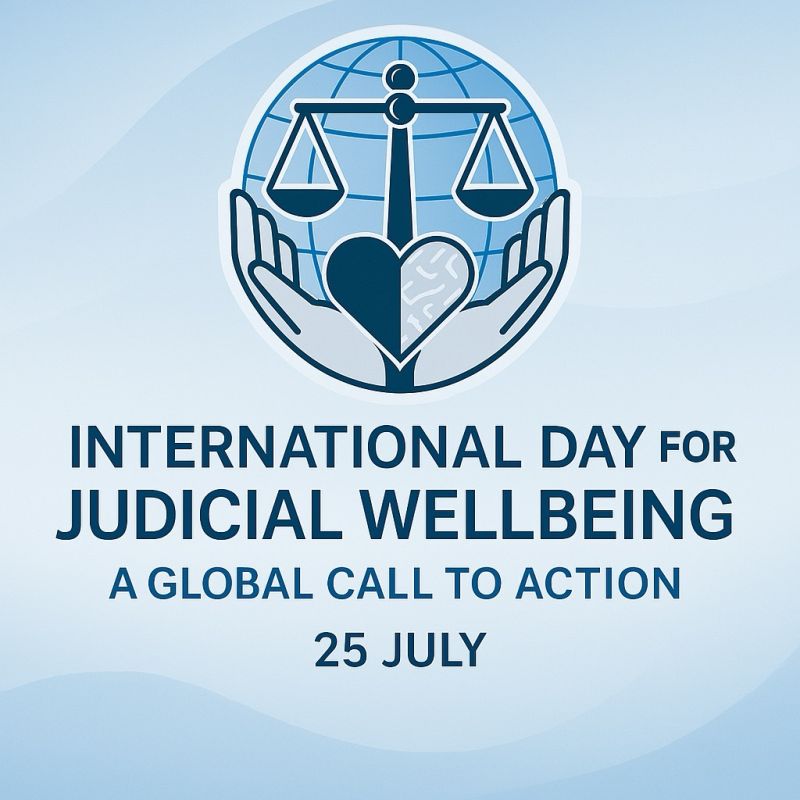
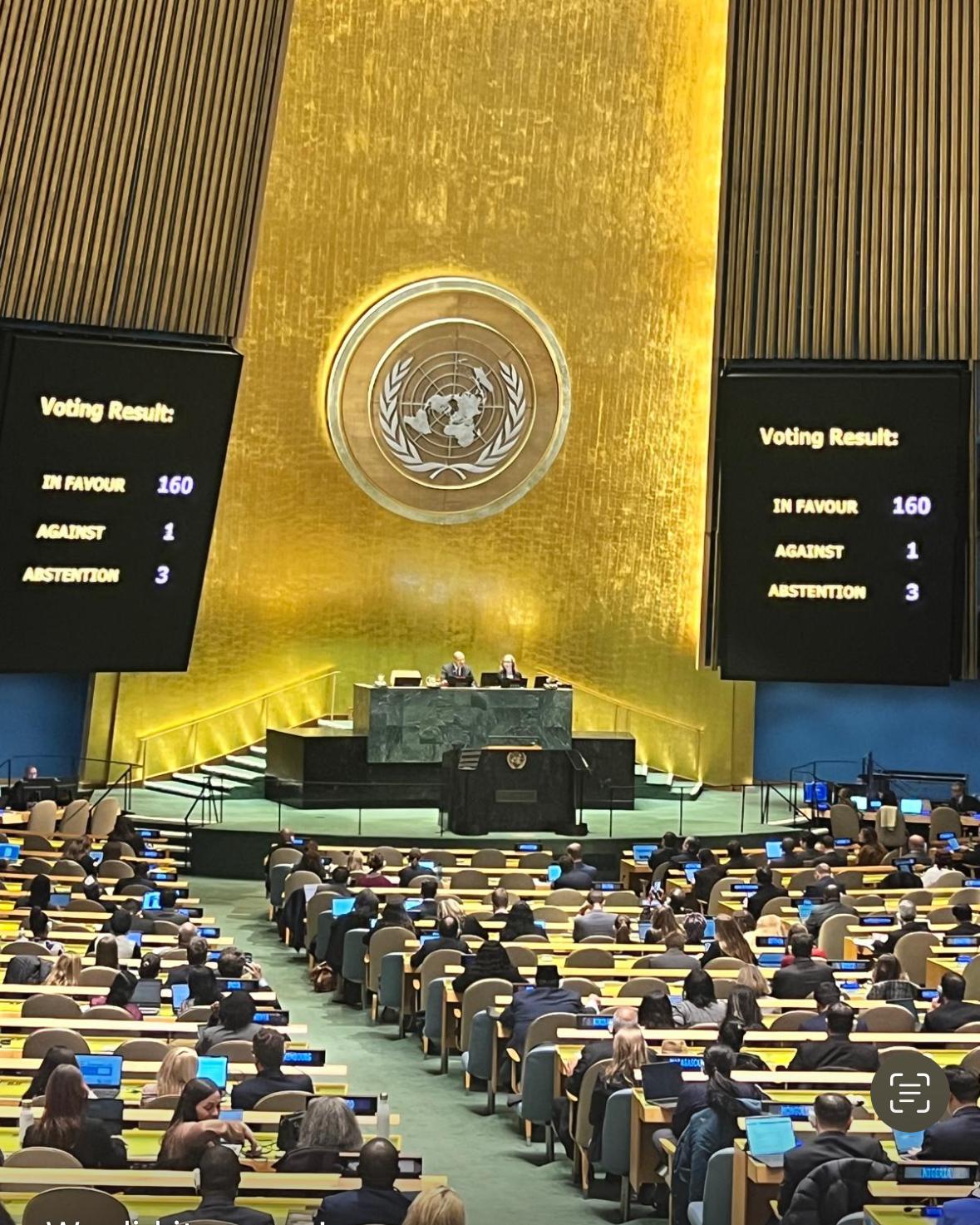 On 4 March 2025, the UN General Assembly’s passed a resolution, declaring 25 July as the International Day for Judicial Wellbeing. This was supported by the government of Nauru. The resolution was adopted by 160 countries to 1 (USA) with 3 abstentions (Haiti, Madagascar, Syria).
On 4 March 2025, the UN General Assembly’s passed a resolution, declaring 25 July as the International Day for Judicial Wellbeing. This was supported by the government of Nauru. The resolution was adopted by 160 countries to 1 (USA) with 3 abstentions (Haiti, Madagascar, Syria).
Justice Rangajeeva Wimalasena who was the inspiration behind the Declaration stated: “Judicial wellbeing is not just about individual resilience, it is about safeguarding the independence, integrity, and effectiveness of judicial systems worldwide. This recognition at the UN level is a testament to the growing awareness that a strong, well-supported judiciary is fundamental to justice and democracy. Let this be a call to action for all stakeholders to prioritise judicial wellbeing and ensure that those who uphold justice receive the support they need.”
judiciary is fundamental to justice and democracy. Let this be a call to action for all stakeholders to prioritise judicial wellbeing and ensure that those who uphold justice receive the support they need.”
On 25 July 2025, the global judicial community celebrated the International Day in their own way. See separate page on this website for information on how the day was marked:
25 July 2025- Celebrations
On 25 July 2025, a Global Judicial Wellbeing Research Hub. The platform is designed to support judiciaries, judges’ associations, and judicial institutions worldwide in conducting empirical studies on judicial well-being using expertly developed, research-based questionnaires. The hub marks a step toward promoting data-driven reform and fostering healthier, more resilient judicial systems globally.
On 25 September 2025, the CMJA General Assembly of Members, meeting in The Gambia, endorsed the Nauru Declaration on Judicial Well-Being:
“The CMJA’s General Assembly endorses the Naura Declaration on Judicial Well-Being and commits itself to promoting the well-being of judicial officers across the Commonwealth through its publications, conferences and events and by supporting the work of the GJIN and UNODC and other national and international organisations promoting judicial well-being”
KEY WEBINARS, EVENTS AND ARTICLES POST NAURU DECLARATION
Several webinars and events have been organised to sustain and amplify its global impact since July 2024.
The Australian Catholic University (ACU) hosted a webinar in October 2024 on the Declaration, led by the Thomas More Law School at which the CMJA President, Hon. Justice Lynne Leitch was one of the speakers. The keynote presentation was given by the Honourable Justice José Igreja Matos, President of the Court of Appeal in Porto, Portugal, and the President of the International Association of Judges (IAJ). The panel of speakers included, the Honourable Lady Justice Jacqueline N. Kamau, Judge of the High Court, Kenya, Her Honour Judge Kaly Kaul KC, Circuit Judge and the Founder of the Judicial Support Network, The Honourable Justice Adrian Saunders, President of Caribbean Court of Justice, The Honourable Justice Rangajeeva Wimalasena, The President of Nauru Court of Appeal, Ms Tatiana Veress, Crime Prevention and Criminal Justice Officer at the United Nations Office on Drugs and Crime (UNODC), and Ms Sara Carnegie, Director, Legal Projects, International Bar Association.
The ACU also organised a celebratory webinar on 20 March 2025 on The Adoption of the UN International Day for Judicial Well-being and Its Global Impact at which Nauru’s Minister for Justice, Hon. Lionel Aingimea, and CMJA President, Lynne Leitch spoke at.
The Judiciary of Papua New Guinea hosted a Conference on Judicial Integrity and Well Being in Port-Moresby, Papua New Guinea supported by the UNODC and Commonwealth Secretariat as a follow-up to the Regional Judicial Conference held in Nauru on July 2025 Commonwealth Secretariat. The theme for the Conference was: “From Principles to Action: Advancing Judicial Well-being as the Foundation for Integrity, Resilience, and Public Trust”
In an interview with Judicature International the President of CMJA, Justice Lynne C. Leitch shared her words on the Declaration’s commitment to judicial well-being: “One of the elements of the Bangalore principles of judicial conduct is a very generalized statement that judges should have sufficient time to permit the maintenance of physical and mental well-being. I think the Nauru Declaration is really adding some meat on the bones, if you will, to that principle.”
This emphasizes how the Nauru Declaration builds on existing judicial standards, like the Bangalore Principles, by providing specific, actionable guidance on well-being.
Moreover, Justice Lynne C. Leitch highlights the practicality of low-cost solutions in addressing judicial well-being, stating, “Sometimes it can be very, very simple things like better communication, more timely indication of assignments, more timely delivery of materials to prepare. They don’t cost any money.” This perspective aligns directly with the Nauru Declaration’s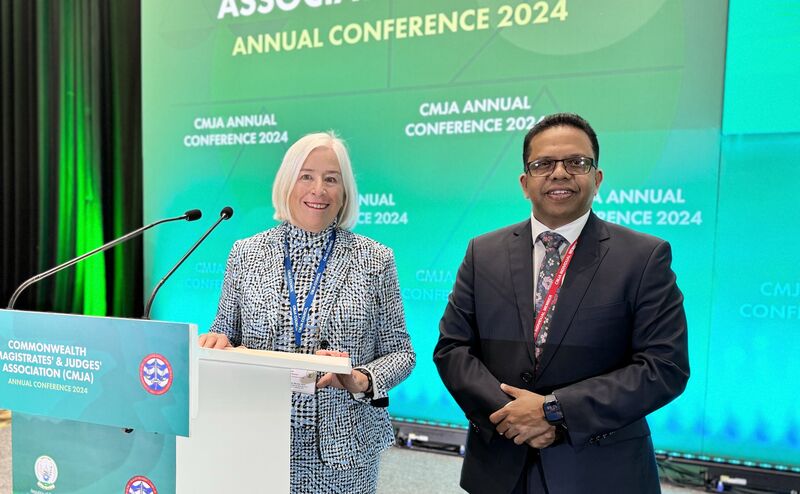 principle that “promoting judicial well-being requires a combination of awareness-raising, prevention, and management activities” and must be tailored to the specific circumstances of each jurisdiction.
principle that “promoting judicial well-being requires a combination of awareness-raising, prevention, and management activities” and must be tailored to the specific circumstances of each jurisdiction.
The Nauru Declaration is a transformative step toward ensuring judicial officers are supported to deliver quality justice, fostering resilient judiciaries and enhancing public confidence globally. It recognises that judicial stress is not a weakness and should not be stigmatised, shifting the focus towards proactive measures for support and prevention. The declaration highlights that judicial well-being is a shared responsibility.
Lira High Court Deputy Registrar, , has urged global action on judicial well-being, warning that financial and work-related stress threaten judicial integrity and independence. At the International Judicial Conference, in Papua, New Guinea, he called for better pay, financial management schemes, wellness programs, and innovative income-generating models to support judicial officers.
“A healthy judge is a productive judge, and a resilient Judiciary is the foundation of public trust.” This he said while delivering a paper titled Coping with Financial and Judicial stress.
The Caribbean Association of Judicial Officers (CAJO) has produced a number of Well-Being Videos available on YouTube:
Judicial Well-Being 360- Be Still
Judicial Well-Being 360- Just Move
LINKS TO ADDITIONAL INFORMATION
- The Bangalore Principles
- The Commentary on the Bangalore Principles of Judicial Conduct
- Judicial Well-Being – Regional Judicial Conference on Integrity and Judicial Well-Being
- Exploring the Linkages Between Judicial Well-being and Judicial Integrity – Report on the Global Survey Conducted by the Global Judicial Integrity Network
- Judicial Well-being Survey 2021 – Report and Action Plan – Judiciary of England and Wales
- Exploring the Wellbeing of Caribbean Judicial Officers – Report on the CAJO’s Judicial Officer Wellness Survey
- Judicial integrity and judicial well-being
- CAJO-Statement-on-Judicial-Wellbeing-and-Work.pdf
ARTICLES ON JUDICIAL WELL BEING
- The Nauru Declaration: A Milestone for Judicial Wellness
- The Psychological Impact of Judicial Work: Australia’s First Empirical Research Measuring Judicial Stress and Well-being by Carly Schrever, Carol Hulbert, and Tania Sourdin
- On Gastronomic Jurisprudence and Judicial Wellness as a Matter of Competence
- Judicial Well Being. From an Unmentionable Topic to a Growing Concern Judicature Vol. 109 No. 1 (2025).

